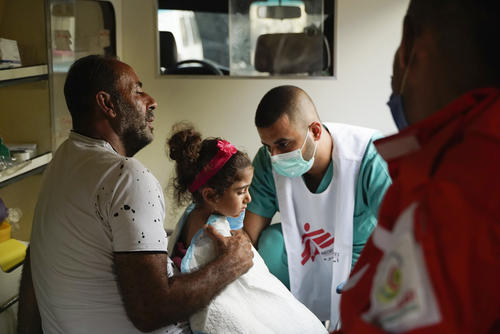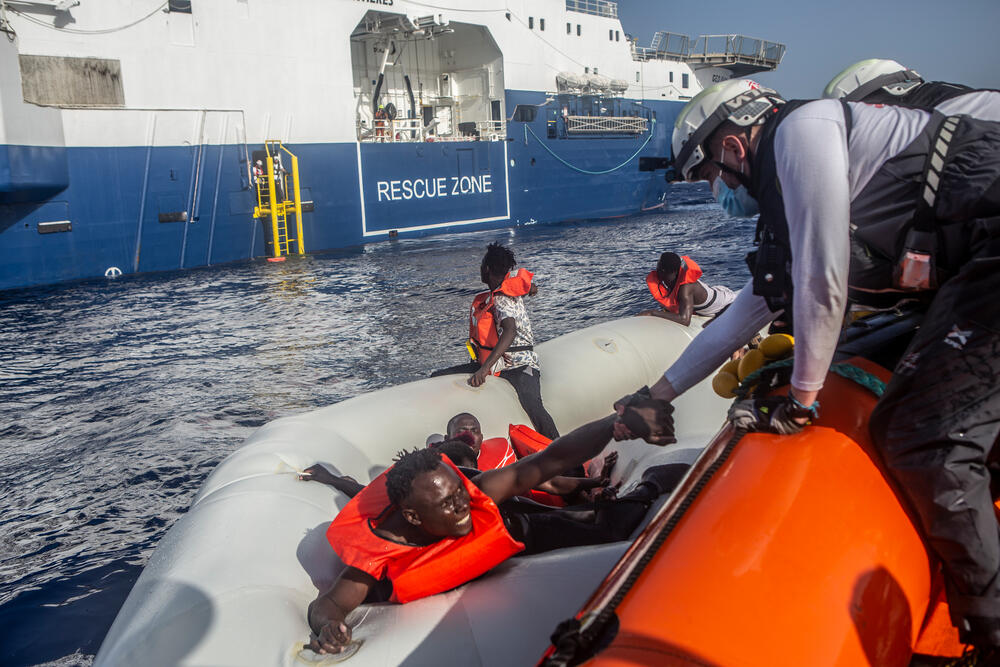Mediterranean: 22 people missing and one dead following tragic rescue
At least 22 people are missing, and a pregnant woman died despite desperate efforts to resuscitate her, following the partial sinking of a rubber boat in the central Mediterranean Sea on Monday, 27 June.
Médecins Sans Frontières / Doctors Without Borders' (MSF) search and rescue team brought 71 survivors from the flimsy sinking rubber boat on board our search and rescue vessel, Geo Barents, and is now urging the Maltese and Italian authorities to allocate a place of safety for the disembarkation of survivors as soon as possible.
The MSF team rescued the survivors, bringing on board a pregnant woman who did not survive despite extensive resuscitation efforts by the medical team.
Three other people needed to undergo emergency care, including a four-month-old baby. The baby and her mother were later evacuated to Malta. Today, the MSF team is looking after the remaining survivors, most of whom are extremely weak and in a state of shock.
Tragedy on Europe's doorstep
“What we faced yesterday was our worst nightmare coming true. When we got closer to the boat in distress and we could see it with our binoculars, we understood how complicated this rescue would be,” says Riccardo Gatti, Search and Rescue Team Leader on board the Geo Barents.
“The boat was sinking with dozens of people trapped, while many were already in the water.”

Get closer to the Frontline
Get the latest news, stories and updates, straight to your inbox.
While the team is still collecting information on the missing people, two women have already told our teams that they lost their children at sea; another young woman explained she lost her little brother. Information on over a dozen more missing people is being gathered through interviews with the grieving survivors.
“The survivors are exhausted; many have ingested large amounts of seawater and multiple people suffered from hypothermia after spending many hours in the water,” says Stephanie Hofstetter, MSF medical team leader on board.
“At least 10 people, mostly women, are suffering from medium to severe fuel burns and need further treatment beyond what can be delivered on board.”
“This traumatic event is a deadly consequence of the growing inaction and disengagement of European and other border states, including Italy and Malta, in the Mediterranean Sea,” says Juan Matias Gil, MSF search and rescue representative.
“Tragedies at sea continue to cost thousands of lives, and these people are being lost on Europe’s doorstep in absolute silence and indifference on the part of EU states.”
“We were in the sea for 19 hours before we were rescued... I saw many people drowning. I am happy that I was saved but it comes with a lot of tears.”
Yesterday, a boat in distress was intercepted by the Libyan Coastguard before Geo Barents could provide assistance. Hours later, Alarm Phone issued an alert on another boat in distress in the area, to which we responded.
The team on Geo Barents navigated for three hours before reaching the rubber boat, which had collapsed and was sinking, while its passengers were struggling to survive, with many already in the sea.
World's deadliest border
Today, the Mediterranean Sea remains the deadliest border in the world, with 24,184 missing migrants recorded since 2014 and 721 in 2022 alone.
EU member states and border states with the Mediterranean Sea are condemning people to drown under policies of non-assistance. MSF demands that all European Union member states ensure a state-led, dedicated and proactive search and rescue capacity is provided in the central Mediterranean Sea, and to provide a fast and adequate response to all distress calls.
“We were in the sea for 19 hours before we were rescued,” says a man from Cameroon who was rescued last night and is now safe on board. “All these hours, I saw many people drowning. I am happy that I was saved but it comes with a lot of tears.”
Geo Barents is now heading to Italy and has reached out to the Maltese and Italian authorities for a place of safety. MSF asks for a timely and safe disembarkation of survivors as soon as possible to avoid increasing survivors’ distress and worsening their mental health.
MSF search and rescue
MSF has been running search and rescue (SAR) activities in the Central Mediterranean since 2015, working on eight different SAR vessels (alone or in partnership with other NGOs). Overall, MSF search and rescue teams in the Central Mediterranean have assisted more than 85,000 people. Geo Barents is MSF’s current chartered search and rescue vessel.
Between June 2021 and May 2022, the ship sailed out 11 times and conducted 47 rescue operations, rescuing 3,138 people and recovering the bodies of a further 10 people who had died in the sea. MSF teams on board conducted 6,536 medical consultations for primary health care, sexual and reproductive health and mental health.
Thirty-four percent of the survivors rescued were children, out of whom 89 percent were unaccompanied and/or separated from their families. Two-hundred-and-sixty-five people reported to our teams having suffered some form of violence, torture or ill-treatment, and 63 people among them reported having suffered sexual and other forms of gender-based violence.
Our medical and humanitarian teams also recorded 620 incidents of violence perpetrated against or witnessed by the people rescued that included physical assault, torture, forced disappearance, kidnapping, arbitrary arrest and detention mainly in Libya but also during their often-multiple interceptions and forced returns by the Libyan coastguards.
